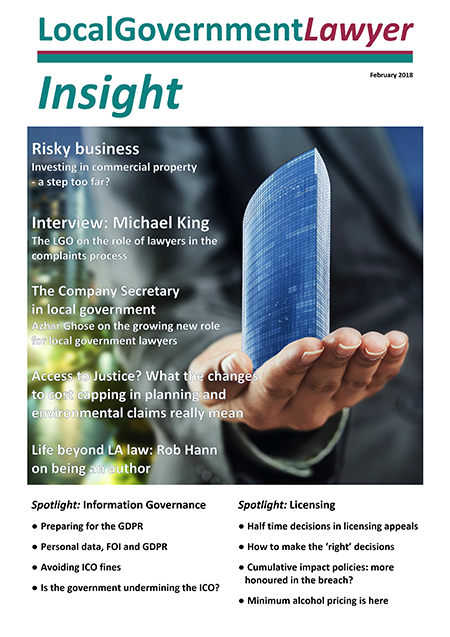Half time decisions in licensing appeals
 Sarah Lefevre looks at the first case in which the higher courts have supported the Magistrates Court’s ability to dismiss cases where there is ‘no case to answer’.
Sarah Lefevre looks at the first case in which the higher courts have supported the Magistrates Court’s ability to dismiss cases where there is ‘no case to answer’.
Late in 2016, a District Judge sitting in the Thames Magistrates' Court dismissed of his own motion an appeal brought pursuant to the Licensing Act 2003 at 'half-time', at the conclusion of the appellant's case.
This is thought to be the first occasion when such a course has been taken in a licensing appeal. The appellant was deeply aggrieved about the decision and sought to challenge it in the High Court, claiming both want of jurisdiction and general unfairness of approach. The High Court refused permission in robust terms, confirming both the existence of the power and the propriety of its exercise.
This article sets out the history of the particular case and the relevant law as confirmed by the High Court's decision. It is likely that all parties to licensing appeals will wish to consider both the manner in which the court assessed and treated the appellant's character. It is virtually certain that all such parties will wish to consider the possibility - or risk - that appeals may be dealt with in this way,
The case
On 21 August 2015, a licensee in the London Borough of Hackney applied pursuant to section 34 Licensing Act 2003 to vary the premises licence which he held for the Efes Snooker Club in Stoke Newington, within one of Hackney's Special Policy Areas. The applicant sought a considerable extension of his opening hours - though not the hours for licensable activity - to 04:00hrs daily. A series of conditions were proposed in support of this application, including a last new entry time of 03:00hrs, 7 days a week. The existing last entry times were 00:30hrs, Thursday to Saturday, and 23:30hrs, Sunday to Wednesday.
It might be thought that, on any view, the application represented a considerable incursion into particularly noise sensitive hours. It might also be thought that such an extension would foreseeably present at least a real risk of interference with the public nuisance licensing objective - particularly with a permitted capacity in the premises of 250 to the local area during sensitive night time hours.
The application attracted three representations by and/or on behalf of local residents, and a fourth from the licensing authority. The licensing authority was particularly concerned about the consumption of alcohol in the 3-3.5 proposed additional hours of opening, and the risk of stockpiling.
The licensee, whilst claiming an increase in the sale of alcohol was no part of his business model - and that he would ensure that no stockpiling took place - nevertheless resisted a condition prohibiting consumption of alcohol on the premises at the conclusion of licensable activities.
On 20 October 2015, a sub-committee of the London Borough of Hackney (as licensing authority) heard and determined the application. The licensee was represented before Hackney and throughout proceedings by the same specialist licensing counsel. The extension of opening hours was refused.
The licensee appealed the refusal pursuant to section 181 of the Act, and the appeal was listed before a District Judge on 30 September 2016 and 3 October 2016 in the Thames Magistrates' Court.
In accordance with the Hope and Glory cases and the Magistrates' Courts Rules 1981, the District Judge first heard the licensee's case. The licensee gave evidence in person. The only additional witness called was his licensing consultant, instructed - according to her - 'very recently', who had undertaken no substantive work herself on the appellant's behalf. She exhibited in turn an unsigned statement from a second consultant, which in turn exhibited an unsigned statement from a third consultant. Neither the second nor third consultants could be located - said the licensee - by the time the appeal was heard.
At the conclusion of the licensee's case, the District Judge indicated that he was considering dismissing the appeal. He wished to receive submissions as to the existence and extent of his powers. Hackney submitted that he did have such a power, relying on the case of Mayes v Mayes [1971] 2 All ER
397 - provided that the appellant was given the opportunity to address the court.
The District Judge agreed, and invited submissions on behalf of the licensee as to why the appeal should not be dismissed. On behalf of the licensee it was suggested that the District Judge should instead recuse himself for bias. The District Judge having declined to recuse himself for bias (on the licensee's application) instead determined that he would dismiss the appeal. A written judgment followed, and Hackney was awarded its costs.
Critical to the District Judge's determination was his conclusion about the “dishonesty” and “untrustworthiness” of the licensee, and the relevance of those findings to the impact on the licensing objectives. In his judgment:
“… he [the licensee] was a dishonest witness who repeatedly used the tactic of denying responsibility for the poor running of licensed premises with which he had, in fact, had a close relationship. I considered that my conclusion that he was dishonest, particularly in relation to the running of licensed premises, fed directly into the grounds upon which the Appellant sought to base his appeal.
“For example, the Appellant sought to deal with Hackney's concerns about the 'stockpiling' of alcohol, which would then be consumed between the end of the licensing hours and closing time, by way of an assurance (supported by a condition on the licence) that he would instruct staff not to permit stockpiling. In light of my findings in relation to the Appellant's dishonesty I considered that such an assurance was, at best, highly questionable and, at worst, worthless.'
“It must be open to me to make my own assessment of the Appellant's credibility. This could not be contingent upon Hackney having to raise the issue.
In relation to any impact on the licensing objectives, I gave the examples of [the licensee's] assurances that he would not permit the stockpiling of alcohol and how my assessment of his dishonesty undermined the value of such an assurance. This point coupled with the proposed late opening hour led directly into the risk of public nuisance being caused in the early hours of the morning”.
The District Judge proceeded to consider these findings under the heading of the prevention of public nuisance. A risk of public nuisance was created by the stockpiling of alcohol in that it “creates the distinct possibility of patrons being allowed to consume alcohol until the early hours and then of very drunk patrons emerging from the premises late at night and inevitable causing disturbance and nuisance to the surrounding inhabitants.” Nothing in the complainant's case, and in particular nothing in the complainant's own evidence, provided any comfort or assurance that this risk would be managed or minimised.
The District Judge confirmed that he had read Hackney's witness statements prior to the commencement of the hearing, and was thus aware of the generality of that what they would say.
However, even had the complainant discredited the evidence of live witnesses, this would and could not have impacted on the analysis of the real and unresolved risk to the licensing objectives. The licensee could not cure or alter the conclusions about his own character once his own case had ended.
The licensee sought to challenge the decision by way of judicial review. His key contention was that the decision to dismiss the appeal was unlawful:
● Because there was no jurisdiction so to do. It was asserted that there was no power to dismiss an appeal provided for in the Licensing Act 2003, and that the personality of the licensee was of at most limited relevance;
● Because there are wider interests that simply those of the parties engaged in the outcome of licensing decisions, and accordingly all information, including the cases for both parties, should be properly considered before reaching a decision.
Hackney resisted the claim. The High Court agreed and robustly refused permission. The correct position in law is as follows.
The law
Section 181 of the 2003 Act provides for appeals against decisions of licensing authorities. Paragraph 9 of Schedule 5 makes general provision about appeals under that part and provides, in so far as relevant, as follows:
(1) An appeal under this part must be made to a magistrates' court.
(2) An appeal under this part must be commenced by notice of appeal given by the Appellant to the designated officer for the magistrates' court within the period of 21 days beginning with the day on which the Appellant was notified by the licensing authority of the decision appealed against.
Per Beatson LJ in R (Essence Bars (London) Ltd) t/a Essence v Wimbledon Magistrates' Court [2016] EWCA Civ 63:
'[13] Appeals brought under the Licensing Act 2003 are dealt with pursuant to sections 51-75 of the 1980 Act [Magistrates' Courts Act 1980] which concern "civil jurisdiction and procedure".'
Per Toulson LJ in R (Hope & Glory Public House Ltd) v City of Westminster Magistrates' Court [2011] EWCA Civ 31): there is no basis for disapplying the Magistrates' Courts Rules 1981, in particular r.14 on the order of speeches to licensing appeals.
The Magistrates' Courts Rules 1981 ['MCR'] provide as follows:
Appeal to be by complaint
34. Where under any enactment an appeal lies to a magistrates' court against the decision or order of a local authority or other authority, or other body or person, the appeal shall be by way of complaint for an order.
The civil jurisdiction of the magistrates' court is extremely broad. It encompasses not only such appeals as fall within r.34 of the MCR, but also a very wide range of applications pursuant to other legislation, all of which are commenced by way of complaint.
A magistrates' court determining a complaint has the power to dismiss the case once (but not before) all the complainant's evidence has been heard:
Mayes v Mayes [1971] 2 All ER 397; Simmons v London Borough of Croydon [1985] FLR 1092, either on its own motion or on the application of the respondent, provided always that the complainant is given the opportunity to address the court before it reaches a conclusion.
Conclusions
The case confirms an obvious aspect of the relevant and applicable procedure in licensing appeals. It was a novel - and perhaps unique - approach by the District Judge in such cases. But there is no reason why the power should not be exercised more regularly, either on application or on the court's own motion.
Sarah Le Fevre is a barrister at Three Raymond Buildings

This article was first published in the February edition of Local Government Lawyer Insight, which can be accessed at http://www.localgovernmentlawyer.co.uk/insight Insight is published four times a year and is circulated free-of-charge to all Local Government Lawyer newsletter subscribers (click here to subscribe) in electronic format. A single hard copy is also circulated to all local authority legal departments in England and Wales. Additional printed copies are available for just £49.95 for four issues. Multiple copies are also available at £149.95 for five or £249.95 for 10. Payment can be made by purchase order/invoice or by credit/debit card. To order, please call 0207 239 4917 or email This email address is being protected from spambots. You need JavaScript enabled to view it.. |



